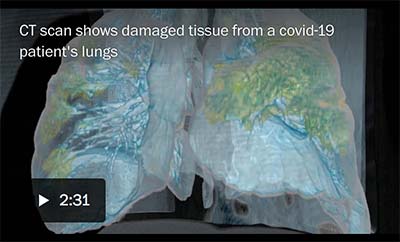Autopsies have long been a source of breakthroughs in understanding new diseases, from HIV/AIDS and Ebola to Lassa fever — and the medical community is counting on them to do the same for covid-19, the disease caused by the novel coronavirus. With a vaccine probably many months away in even the most optimistic scenarios, autopsies are becoming a critical source of information for research into possible treatments.
Blood-clotting complication is killing coronavirus patients, doctors say - The Washington Post < https://www.washingtonpost.com/health/2020/04/22/coronavirus-blood-clots/ >
Increasingly, doctors also are reporting bizarre, unsettling cases that don’t seem to follow any of the textbooks they’ve trained on. They describe patients with startlingly low oxygen levels — so low that they would normally be unconscious or near death — talking and swiping on their phones.
Then came the autopsies. When they opened up some deceased patients’ lungs, they expected to find evidence of pneumonia and damage to the tiny air sacs that exchange oxygen and carbon dioxide between the lungs and the bloodstream. Instead, they found tiny clots all over.
More likely, she said, the problem was more obvious to American doctors because of the unique demographics of U.S. patients, including large percentages with heart disease and obesity that make them more vulnerable to the ravages of blood clots.

The concern is so acute some doctor groups have raised the controversial possibility of giving preventive blood thinners to everyone with covid-19 — even those well enough to endure their illness at home.
Quinidine, one of the main Cinchona alkaloids present in the QUININE TEA INFUSION ( www.quinine-tea.com) , prevents blood clots. The alkaloid does not act on the contraction of the heart, but slows and regulates it. This means that it can be considered as a cardiac relaxant or sedative, which has the peculiarity of relieving TACHYCARDS and FIBRILLATIONS. Quinidine causes a depression of cardiac function and thus decreases the heart rate; and this phenomenon as such is called: BATMOTROPIC EFFECT